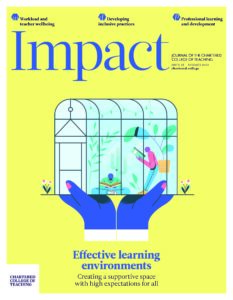Online and informal support for teaching placements: A case study from one higher education institution in England
Written by: James Bettany, Claudia Blandon, Cara Baer, Jan Georgeson, Alison Egan and Elena Revyakina

5 min read
James Bettany, Claudia Blandon, Cara Baer and Jan Georgeson, University of Plymouth, UK
Alison Egan, Marino Institute of Education, Dublin, Ireland
Elena Revyakina, University College of Teacher Education, Austria
Introduction
This study focuses on primary student teachers based in the south-west of England. Students are enrolled on a three-year bachelor’s degree that includes the award of ‘qualified teacher status’ (QTS), qualifying them to teach in state schools in England. Their three-year programme includes academic work on curriculum, pedagogy and education studies. They also complete 24 weeks of teaching practice. Schools allocated to the students by the awarding institution range from small village schools to large three-form-entry urban primary schools, and have diverse intakes in terms of socioeconomic, ethnic and cultural backgrounds. Study participants have been recruited from the first year of the degree cohort and are typically school leavers.
This case st
Join us or sign in now to view the rest of this page
You're viewing this site as a guest, which only allows you to view a limited amount of content.
To view this page and get access to all our resources, join the Chartered College of Teaching (it's free for trainee teachers and half price for ECTs) or log in if you're already a member.
- Boud D, Cohen R and Sampson J (2014) Peer Learning in Higher Education: Learning From and With Each Other. London: Routledge.
- Braun V and Clarke V (2013) Successful Qualitative Research: A Practical Guide for Beginners. London: Sage.
- Caires S, Almeida L and Viera D (2012) Becoming a teacher: Student teachers’ experiences and perceptions about teaching practice. European Journal of Teacher Education 35(2):163–178.
- Cheung WM and Wong WY (2014) Does Lesson Study work? A systematic review on the effects of Lesson Study and Learning Study on teachers and students. International Journal for Lesson and Learning Studies 3(2):137–149.
- Garrison DR (2017) E-Learning in the 21st Century: A Community of Inquiry Framework for Research and Practice, 3rd ed. London: Routledge/Taylor and Francis.
- Hall E, Chai W and Albrecht JA (2016) A qualitative phenomenological exploration of teachers’ experience with nutrition education. American Journal of Health Education 47(3): 36–148.
- Heggen K, Raaen FD and Thorsen KE (2018) Placement schools as professional learning communities in teacher education. European Journal of Teacher Education 41(3): 398–413.
- Hilsdon J (2014) Peer learning for change in higher education. Innovations in Education and Teaching International 51(3): 244–254.
- Peeters J, De Backer F, Buffel T et al. (2014) Adult learners’ informal learning experiences in formal education setting. Journal of Adult Development 21(3): 181–192.
- Petrovic T, Kennedy G, Chang R et al. (2008) Podcasting: Is it a technology for informal peer learning? ASCILITE 2008 – The Australasian Society for Computers in Learning in Tertiary Education, pp. 761–765.
- Sorensen P (2014) Collaboration, dialogue and expansive learning: The use of paired and multiple placements in the school practicum. Teaching and Teacher Education 44: 128–137.
- Wright P and McCarthy J (2008) Empathy and experience in HCI. In: Proceedings of the SIGCHI Conference on Human Factors in Computing Systems, April 2008, pp. 637–646.
0
0
votes
Please Rate this content
Please login to comment
0 Comments
Oldest
Newest
Most Voted
Inline Feedbacks
View all comments










